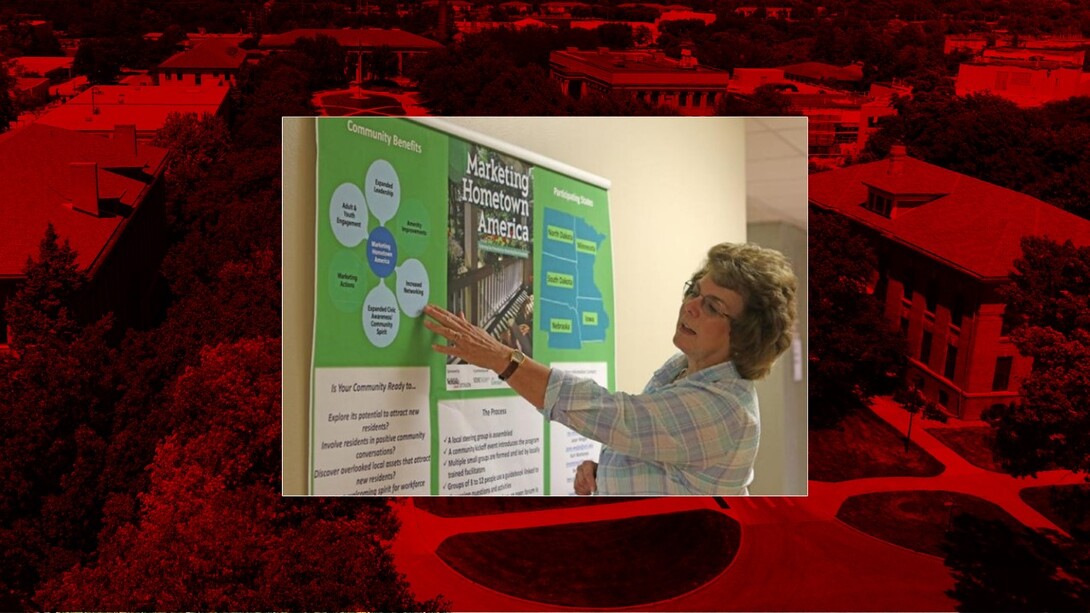
About Cheryl Burkhart-Kriesel
I often tell people I wear two hats – one as a faculty member of the university and the other as an agri-business co-owner/operator. Both keep me very busy, but they also work together to keep me grounded in issues critical to rural communities.
What is your position at the University of Nebraska-Lincoln?
I am a professor in Agricultural Economics and Extension Specialist where I am focused on community development. My office is at the Panhandle Research and Extension Center in Scottsbluff. I’ve had several positions over the years with the University of Nebraska including work as a regional Extension Educator and as a Learning Center Coordinator. Since 2001, I have been in this position primarily serving the panhandle region but also offering statewide expertise and community advisement when needed. I was asked recently to function as a convener for the Extension component of the IANR Rural Prosperity Nebraska Hub.
What drew you to the University of Nebraska-Lincoln?
I love to learn and I am passionate about both agriculture and rural communities in Nebraska. My current position marries those interests very well.
What aspect of working in an educational setting do you enjoy the most?
We are blessed in Nebraska with research and extension centers across the state. Working at the Panhandle Research and Extension Center is a great opportunity to interact with faculty who have various ag-related expertise on a one-to-one basis. We get to know each other – there is tremendous respect and collegiality. We live the notion of trans-disciplinary.
What do you consider your greatest achievement?
On the academic side, working with several USDA funded research projects has been very fulfilling. I enjoy seeing the basic research translated into opportunities for behavior change. One project, working with new resident recruitment and retention, has been very rewarding. Starting with a USDA grant in western Nebraska, the work has grown to include research in both North and South Dakota with the results of the project being translated into a community process now used in eight states. On the agri-business side, maintaining and growing a business for over 35 years is a real accomplishment. Starting as a local then regional small grain certified seed business, we are now adding a component to our business to grow, condition and market food-grade waxy millet to overseas buyers. When you load out shipping containers destined to Japan and South Korea from a location near Gurley, Nebraska, population 200, you realize how small the world really is. I would be amiss if I did not mention my involvement with the Nebraska Wheat Growers Association as an accomplishment as well. I served on the Board of Directors for many years and was ultimately elected President. I was humbled by their support.
What is something that most people don’t know about you?
Many people don’t know that I am the primary combine operator for our business, Kriesel Certified Seed, during wheat harvest. Long hours and constant vigilance are required because so many things can go wrong very quickly. But it is also very satisfying seeing 30 ft of beautifully golden wheat roll into your header and be pulled into the machine – it is almost Zen-like. In the cab with all the high-tech features, you can see a map being made of the harvested field and know an estimated yield and moisture in real-time. It is a bit uncommon to have a woman operating a combine. I get a lot of “double takes” when I meet custom cutters in their machines on the county road moving from field to field. A true confession - I have even been known to attach a UNL flag to the cab of our red Case-IH combine for a little pizzazz and to perhaps irritate the customer harvesters from other states!
What is your life like outside of work?
With two very demanding jobs, life outside work is pretty rare. But both my husband I enjoy getting out to observe nature. He enjoys hunting, especially turkey hunting in the spring. So I go along for the experience of seeing the vegetation and wildlife in the spring, which can be totally amazing. Many years ago, he set a goal of hunting turkeys in every state. Right now we only have five southern states plus the state of Hawaii left (for those that wonder… the only state without turkeys is Alaska). We have also harvested birds from all six subspecies, with two sub-species being in Mexico.







